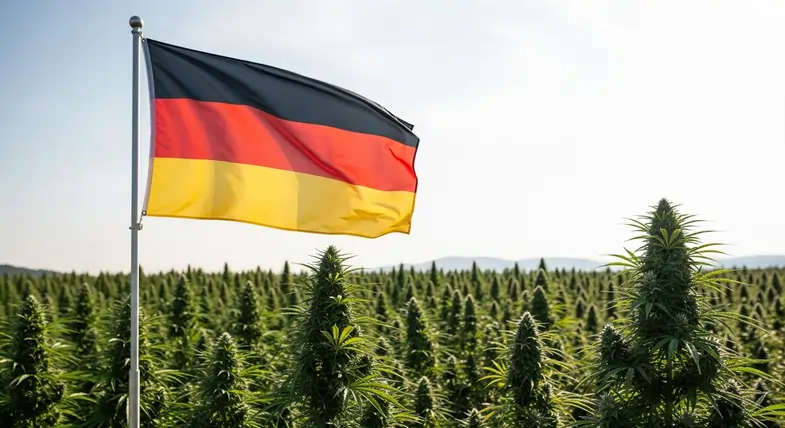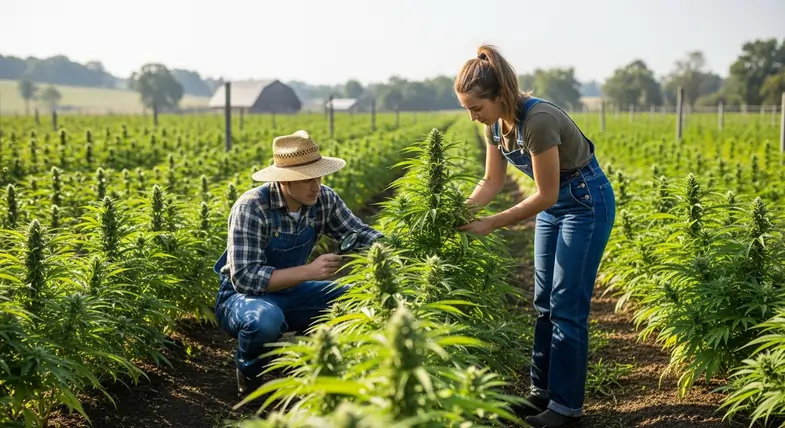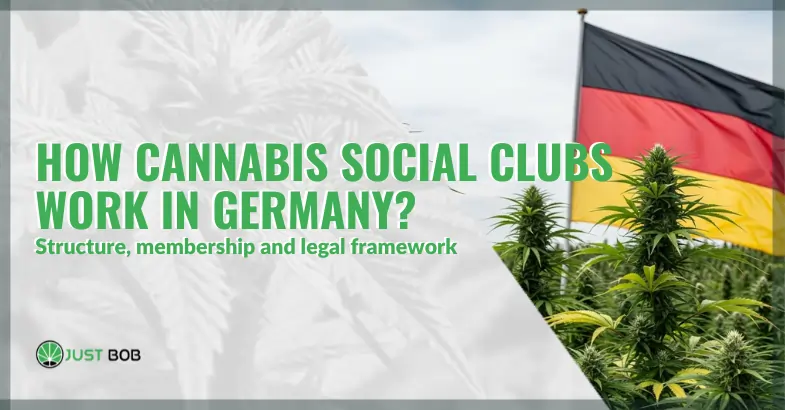Published on: 22/10/2025
The German model provides for legal distribution through non-profit associations, with strict rules on quantities, membership requirements and product traceability
In a legislative move that has attracted attention across Europe, Germany has redefined its policy on soft drugs. As of 1 April 2024, the country has partially legalised cannabis, becoming the third nation in the European Union, after Malta and Luxembourg, to take this step.
The reform, enshrined in the law known as Cannabisgesetz (CanG), is divided into two distinct phases.
The first, which came into force in April, decriminalised the possession of small quantities for personal use (up to 25 grams in public) and authorised home cultivation of up to three plants per adult.
The second phase, effective from 1 July 2024, introduces and regulates the legal supply system: cultivation associations, better known as cannabis social clubs (CSCs).
This model represents a thoughtful and highly controlled approach, which differs significantly from the commercial logic seen in other international contexts.
The German legislator’s stated objective is twofold: to dry up the black market by offering a safe and traceable alternative, and to strengthen public health protection and the protection of minors through a stringent regulatory framework.
Understanding how these new entities work is essential to understanding the scope and limitations of the German reform.
Please note, however, that this article by Just Bob is for informational purposes only. Cannabis laws vary greatly from country to country and within individual jurisdictions.
The cultivation, possession, distribution and consumption of cannabis are subject to strict regulations and may constitute a criminal offence. It is therefore recommended that you inform yourself and strictly comply with the laws in force in your territory.
Now that we have covered the necessary groundwork, we can begin the article. Enjoy reading!
Read also: Cannabis Alkaloids Uncovered: The Hidden Chemistry of the Hemp Plant
The Regulatory Framework: The Konsumcannabisgesetz (KCanG)
The legal basis governing clubs is the Konsumcannabisgesetz (KCanG), a specific section of the broader Cannabisgesetz.
This legislation defines every aspect of a club’s life with surgical precision: from its establishment to its management, from membership criteria to product distribution methods (such as legal hash, for example).
The text of the law leaves no room for ambiguous interpretations. Cannabis social clubs, officially called Anbauvereinigungen (cultivation associations), are conceived as private, non-profit entities whose existence is entirely dedicated to community cultivation and the subsequent distribution of cannabis to members only for their personal consumption.
This approach categorically excludes any commercial purpose. The clubs are not dispensaries open to the public, nor are they places of consumption such as Dutch “coffee shops”. They operate as specialised agricultural cooperatives, financially supported by membership fees.
The law specifies that membership fees must be structured in such a way as to cover only operating costs (rent, energy, materials, staff, security), without generating profits.
Differentiation of fees based on the amount of product a member intends to receive monthly is permitted, but the price per gram must always reflect the actual costs of production and management, not market dynamics.


Structure and Operations: From Cultivation to Delivery
The operation of a German cannabis social club is a meticulously regulated process. Cultivation must take place collectively within protected and authorised facilities, under the supervision of qualified personnel and with the active participation of members, in accordance with the statutes of each association. Transparency is a fundamental element of the system.
The distribution of the finished product is subject to very strict constraints. Delivery can only take place within the club’s premises, which must be adequately fenced off and protected from unauthorised access.
Members must appear in person to collect their order, and their identity and age must be verified by means of a valid document for each individual transaction. This mechanism prevents transfer to third parties and ensures that only registered members can access the product.
The law categorically prohibits the shipment or home delivery of cannabis.
In addition, clubs are subject to a total ban on advertising and sponsorship. These measures have been implemented to avoid encouraging consumption and to keep the clubs’ profile low and focused on their associative mission, rather than on commercial promotion.
The substance must be supplied in neutral, anonymous packaging without any eye-catching graphics. Each package must be accompanied by a detailed information sheet stating the net weight, date of harvest, expiry date, genetic variety of the plant, average THC (tetrahydrocannabinol) and CBD (cannabidiol), and a series of health warnings about the risks associated with consumption.
Membership: Strict Criteria for Exclusive Access
Becoming a member of a cannabis social club in Germany is a process governed by strict criteria, designed to ensure control and prevent abuse. The first requirement is age: only persons aged 18 or over may join.
Each club can have no more than 500 members, a maximum limit that serves to keep the associations at a manageable size and prevent the formation of large entities with commercial potential.
Another fundamental rule is that of exclusivity: an individual can only be a member of one cannabis social club in the whole of Germany. At the time of registration, the applicant must declare in writing that they are not associated with any other Anbauvereinigung. This rule was introduced to prevent a person from accumulating quantities of cannabis in excess of the legal limits by turning to multiple sources.
To combat the phenomenon of so-called “cannabis tourism”, the law imposes a further restriction: in order to register, you must have been resident or habitually resident in Germany for at least six months.
This measure ensures that the model serves the local population and does not become an attraction for foreign visitors. Finally, club statutes must provide for a minimum membership period of three months, thus discouraging “hit-and-run” memberships and encouraging the creation of a stable community that participates in club life.
Quantities, Limits and Product Types
The law not only defines who can access the clubs, but also how much and what type of product they can receive. Distribution limits are differentiated according to age, with a view to greater protection for younger people.
- Members aged 21 and over: they can receive a maximum of 25 grams of cannabis per day and up to a limit of 50 grams per month.
- Members aged between 18 and 20: for them, the monthly limit is reduced to 30 grams. In addition, the cannabis intended for them cannot have a THC content of more than 10%. This threshold was introduced on the advice of medical experts to mitigate the risks that a high concentration of the active ingredient can have on a brain that is still developing.
It is important to note that the law allows clubs to distribute cannabis exclusively in its “pure form”, i.e. dried CBD flower (marijuana) or separated resin (hashish). Processed products such as edibles (biscuits, cakes), oils, extracts or liquids for electronic cigarettes are explicitly prohibited. Transferring the product received from the club to third parties is strictly prohibited and constitutes an offence.
In addition to the final product, clubs are also authorised to supply propagation material for home cultivation. They may transfer up to a maximum of 7 seeds or 5 cuttings per month to their members.


Logistical Requirements and Consumption Prohibitions
The choice of location for a cannabis social club is not left to chance. The law imposes a very strict location ban: clubs cannot be located within 200 metres of the entrance to schools, nurseries, children’s playgrounds and other facilities dedicated to minors. This rule, known as the “proximity ban”, is intended to create a physical barrier between places where cannabis is distributed and environments frequented by young people.
Cannabis consumption is strictly prohibited on club premises and in immediately adjacent areas. This reinforces the idea that clubs are places of cultivation and distribution, not socialisation based on consumption.
The ban on consumption also extends to public spaces, with specific rules.
It is prohibited to consume cannabis in the vicinity of the aforementioned facilities for minors and public sports facilities. In addition, consumption is prohibited in pedestrian areas during daylight hours, generally between 7:00 a.m. and 8:00 p.m.
Individual Länder (federal states) have the power to issue additional regulations to specify the penalties and methods of enforcement of these prohibitions.
Authorisations, Controls and Traceability
The opening of a cannabis social club is subject to the issuance of an authorisation by the competent authorities of the relevant Land. The application process, which can be initiated from 1 July 2024, is complex and requires the submission of a detailed plan that includes a security concept, a health and child protection plan, and proof of the reliability and suitability of the members of the board of directors.
The authorities carry out thorough checks before granting the licence, which is valid for seven years and can be renewed. Once obtained, the authorisation enjoys a protection clause (Bestandsschutz) in the event that a new facility for minors opens within 200 metres.
Traceability is a central element of the system. Clubs must meticulously document every step of the process, from sowing to harvesting to distribution. Each delivery to a member is recorded to ensure compliance with individual quantity limits. Regional authorities are responsible for conducting regular inspections to verify compliance with regulations, product quality standards and the effectiveness of preventive measures.
In summary, the German model of cannabis social clubs represents a legislative and social experiment that is attracting great interest in Europe. The aim is to create a carefully balanced approach that seeks to take market share away from organised crime without completely liberalising the sector.
Through a dense network of rules, limits and controls, Germany is attempting to control the spread of cannabis, not by encouraging it but by regulating it, placing health protection and the protection of young people at the heart of its new policy.
Read also: What is the cannabis origin ? Here is its history
Germany and cannabis: an experiment that Europe is watching closely
Now that we have reached the end of this journey into the German model of cannabis social clubs, it is important to take a step back and remember one essential point: we are talking about a unique and extremely strictly regulated experience, which only makes sense and is only legitimate within the German legal framework.
Outside that context, the rules change radically. In many European countries, cannabis remains prohibited, and what is permitted in Germany – within strict limits, with tight controls and absolute bans on advertising or trade – may constitute a criminal offence elsewhere, with potentially very serious consequences.
It should not be forgotten that CSCs are not “coffee shops” or recreational spaces: they are non-profit associations, subject to continuous controls, created to reduce the black market and protect public health.
For this reason, it is essential to reiterate that this article is for informational purposes only. It is not an invitation to cultivate or consume, but an in-depth look at how Germany is attempting to regulate a complex phenomenon.
Anyone interested in these issues should do so with full awareness, always checking the laws in force in their own country. The only correct way to address the issue of cannabis is to comply with the rules, with the understanding that legality is an essential condition for any responsible choice.
See you soon for a new article on the world of CBD cannabis.
Cannabis social clubs in Germany: takeaways
- German cannabis social clubs, or Anbauvereinigungen, are not shops or “coffee shops”. They are non-profit associations whose sole purpose is collective cultivation for the exclusive personal consumption of their members, operating on the basis of membership fees to cover costs.
- Access to clubs is limited to a maximum of 500 members per association, all of whom must be of legal age and have been resident in Germany for at least six months. The law imposes a strict rule of exclusivity: each individual can only be a member of one club, a measure designed to prevent cannabis tourism and commercialisation.
- The distribution of cannabis is subject to monthly limits differentiated by age group (50g for those over 21, 30g with limited THC for those aged 18-20). The product is delivered in neutral packaging with detailed information on composition and health warnings, in order to ensure transparency and awareness.
Cannabis social clubs in Germany: FAQ
Can a tourist visiting Germany join a cannabis social club?
The law explicitly requires that in order to become a member of a club, you must have been a resident or habitual abider in Germany for at least six months. This measure was specifically designed to prevent so-called “cannabis tourism”.
Can cannabis social clubs sell products such as oils, extracts or edibles (e.g. cannabis cakes)?
The legislation is very clear on this point and allows clubs to distribute only “pure” cannabis to their members, i.e. dried flowers (marijuana) and resin (hashish). The sale of any other derivative or processed product is prohibited.
Is it possible to be a member of more than one club at the same time in order to obtain a larger quantity of cannabis?
The law imposes a principle of exclusivity: a person can only be a member of one cannabis social club. Upon joining, you must sign a declaration certifying that you are not a member of any other similar association. This rule is essential to ensure compliance with monthly possession and consumption limits.









